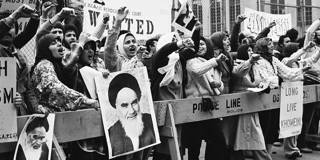A unifying thread of modern revolutions is that societies become politically so divided only after a long period in which it is increasingly clear that reforms are necessary, but those in power, oblivious to how dire the situation has become, block the measures that could save the regime.
SEATTLE – The best-known modern revolutions have invariably been preceded by increasing polarization and an inability to solve pressing social and economic problems. Growing hostility and mistrust fuel protest, eventually leading to violence. Extremism increases because moderates find themselves forced to ally themselves with those farther to the left or right. Those who try to find compromises with moderate forces on the other side wind up being vilified and excluded. That is happening today in much of the world, including the United States. The US is not about to have another revolution, but it may be creeping closer as the political center collapses.
The most obvious historical examples show how this has happened in the past. The French Revolution of 1789 was at first guided by liberal Enlightenment ideals. But the King and aristocracy resisted losing their privileges. Foreign powers intervened against the Revolution, moderate leaders like Lafayette, a hero of the American Revolution who wanted to establish a constitutional monarchy, were increasingly reviled by the left as royalist tools and by the right as revolutionary traitors. That played into the hands of the Jacobins, who instituted a reign of terror and provoked a brutal civil war that killed hundreds of thousands.
In the Russian Revolution of 1917, at first more liberal and moderate socialists, led by Alexander Kerensky, took power. They made the mistake of not getting Russia out of World War I, and when challenged by right-wing generals trying to restore the monarchy, they panicked and distributed arms to Lenin’s Bolsheviks, who took advantage of the situation. In so polarized a situation, moderate socialists remained allied with the Bolsheviks until they found out, too late, that they, too, were destined for extermination.

SEATTLE – The best-known modern revolutions have invariably been preceded by increasing polarization and an inability to solve pressing social and economic problems. Growing hostility and mistrust fuel protest, eventually leading to violence. Extremism increases because moderates find themselves forced to ally themselves with those farther to the left or right. Those who try to find compromises with moderate forces on the other side wind up being vilified and excluded. That is happening today in much of the world, including the United States. The US is not about to have another revolution, but it may be creeping closer as the political center collapses.
The most obvious historical examples show how this has happened in the past. The French Revolution of 1789 was at first guided by liberal Enlightenment ideals. But the King and aristocracy resisted losing their privileges. Foreign powers intervened against the Revolution, moderate leaders like Lafayette, a hero of the American Revolution who wanted to establish a constitutional monarchy, were increasingly reviled by the left as royalist tools and by the right as revolutionary traitors. That played into the hands of the Jacobins, who instituted a reign of terror and provoked a brutal civil war that killed hundreds of thousands.
In the Russian Revolution of 1917, at first more liberal and moderate socialists, led by Alexander Kerensky, took power. They made the mistake of not getting Russia out of World War I, and when challenged by right-wing generals trying to restore the monarchy, they panicked and distributed arms to Lenin’s Bolsheviks, who took advantage of the situation. In so polarized a situation, moderate socialists remained allied with the Bolsheviks until they found out, too late, that they, too, were destined for extermination.